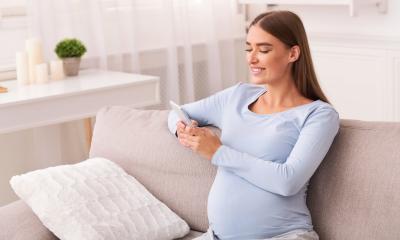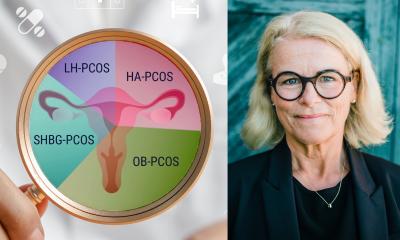Image source: Adobe Stock/lariBat
News • Mobile health technologies
Contraception counseling: Doctors shy away from digital methods
New digital contraceptive methods, such as apps or wearables to determine fertile days, are gaining in popularity.
University of Amsterdam medical anthropologist Ellen Algera and her colleagues investigated whether and how these new methods find a place in the consultation room. They observed hesitation among healthcare providers to counsel on these methods and a lack of reliable information. Given the growing popularity of hormone-free contraceptive methods, the researchers, in their recently published article in the European Journal of General Practice, advocate for more attention to these methods. According to them, this requires the renewal of guidelines and a more open attitude toward these methods.
As long as healthcare providers do not see these methods as contraception or only warn against using them, there will be a gap between healthcare providers and users of these methods. We hope to build a bridge here
Ellen Algera
In the study, Algera and collegues analyzed the contraceptive guideline, observed conversations in the consultation room, and interviewed healthcare providers in general practice. They observe that healthcare providers tend to choose risk minimization when it comes to the preference for hormone-free contraception and new digital contraceptive methods. This shifts the focus away from personalized guidance, hindering person-centered care. ‘As long as healthcare providers do not see these methods as contraception or only warn against using them, there will be a gap between healthcare providers and users of these methods. We hope to build a bridge here,’ says Algera.
She calls the cautious attitude of healthcare providers understandable because there is a lack of scientifically grounded knowledge on how different methods work and how well, as well as the requirements for their use. And this lack of information also affects the user. ‘Various apps and wearables are entering the market, sold with attractive words. However, the reliability figures used to promote these methods are not always based on robust scientific research. Users may choose the method that is most heavily promoted on social media, not necessarily the one with scientific backing or the one that best suits individual preferences.’
‘But critically assessed scientific knowledge is already available,’ says Algera. ‘A systematic review of research on new digital methods and low-tech methods based on fertile days shows that effectiveness varies widely between methods, from 66% to 98% with typical use - where the users may make some mistakes. In addition, methods relying on multiple parameters and providing good support, such as the sympto-thermal method, perform, better than a simple calendar method or a temperature app. Although we need more research on different methods’ effectiveness, the scientifically substantiated information that we already have could be better accessible to healthcare providers and users, so that people can make well-informed choices.’
In addition to this scientifically grounded information, the authors advocate for attention to motivation and necessary skills in counseling. The likelihood of pregnancy is co-determined by the motivation of both partners to prevent pregnancy and the ability to apply a method correctly. Due to this user dependence, healthcare providers quickly discourage these methods as users can make mistakes,’ Algera explains. Instead, the authors propose to approach it from the other side, through thoroughly investigating of users’ motivation and their need for support. ‘If the use of these methods increases, it is better for users to be well-prepared.’ says Algera.
Source: University of Amsterdam
31.01.2024










